#low culture
Quote
We do not pointedly prefer football to opera; we do not think it is better, more pure, more human to be poor than to be rich. We do not think it is inevitable that human kindness is more likely to be encountered in working class individuals than in middle class individuals. We do not think working class people are better than anybody else because they have been defined as belonging to one or other social category. We are not interested in working class culture...We do not celebrate the working class: working class life is rubbish, it is not a condition to be aspired to, and the past thirty 24 years of pro-revolutionary fetishisation of the proletariat as a thing in itself (the legend has it that the leftist group Militant used to force its activists to wear flat caps and donkey jackets on their paper sells so as to fit in) has mistaken and confused the actual power of the working class and reduced the proletariat to the status of just another oppressed minority.
Monsieur Dupont, Nihilist Communism, pg. 23-24
#monsieur dupont#nihilist communism#working class#working class culture#cult#low culture#rainbow high#fetishization
121 notes
·
View notes
Quote
There is no cultural Avant Garde on the left anymore. Even Hipster culture was more about re-discovering and repurposing aesthetic niches, in a late capitalist sense, rather than creation in a more Promethean sense. Today’s left is encapsulated by woke corporate art, such as a public works project to put murals on signal boxes around Uptown Seattle, that looks like something straight out of a corporate diversity, inclusion, and equity training manual...Neon represents the promethean spirit of optimism and innovation of earlier stages of capitalism, that has been lost in late stage capitalism. However, Neon initially garnered scorn from both traditionalists and leftwing anti-consumerists. For instance in Simon & Garfunkel’s Sound of Silence, the “Neon god” referenced in the lyrics, represented crass commercialism, in contrast to the neon nostalgia of today. There is irony in these boomer left icons using the term “Neon god,” which sounds like the name of a fashwave artist or a neo-pagan retro-futuristic occultist. Also there are historic ironies that the inventor of Neon signage, Georges Claude, was a French fascist collaborator in World War II.
Robert Stark, (August 6th 2022).
3 notes
·
View notes
Text
youtube
0 notes
Text
FAULTY COGNITIONS- “Demo” TAPE OUT NOW!! 💥🧠
San Antonio, Texas cooked socially conscious low-fi garage pop-punk excellence from Chris Mason (Dirt Cult Records, Shang-a-lang, Low Culture) & friends. Naturally, one of our favorite demos to drop this year. And it should be yours too. Limited to 30 short-run Transparent Cassette Tapes. Order now @ deadbrokedistro.com
#dead broke rekerds#punk#diy#faulty cognitions#shang-a-lang#low culture#dirt cult records#garage punk#lo fi punk#Bandcamp
1 note
·
View note
Text
Bijna iedere dag muziek: Aerial
https://youtu.be/vCw796Qz4M0?feature=shared
Ik luisterde naar Aerial, het nieuwe album van Kate Bush, haar eerste sinds twaalf jaar. Terwijl de etherische klanken zich ontrolden, wilde de gedachte aan die jongenskamer van de skater maar niet wijken. Bij iedere nieuwe track resoneerde in mijn beleving nadrukkelijk het hele oeuvre van La Bush mee; de prille ode aan Emily Brontës Wuthering Heights…

View On WordPress
#Aerial#Deus#Emily Bronte#Gabriel Rossetti#high art#Joost Zwagerman#Kate Bush#low culture#popmuziek#Tom Barman
1 note
·
View note
Text
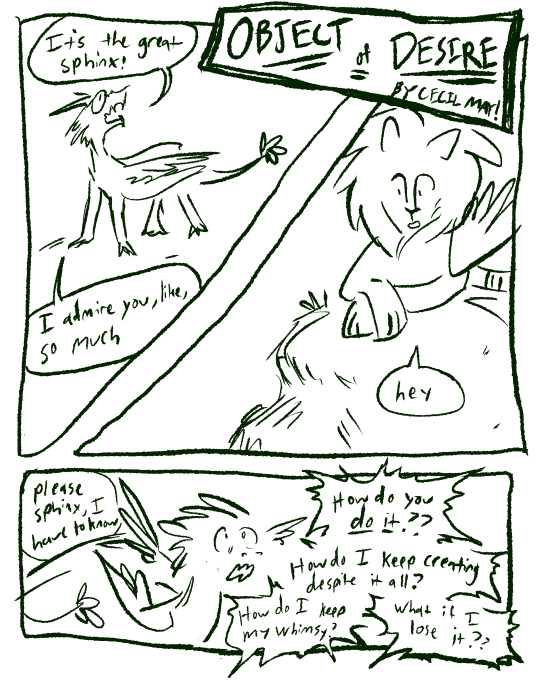
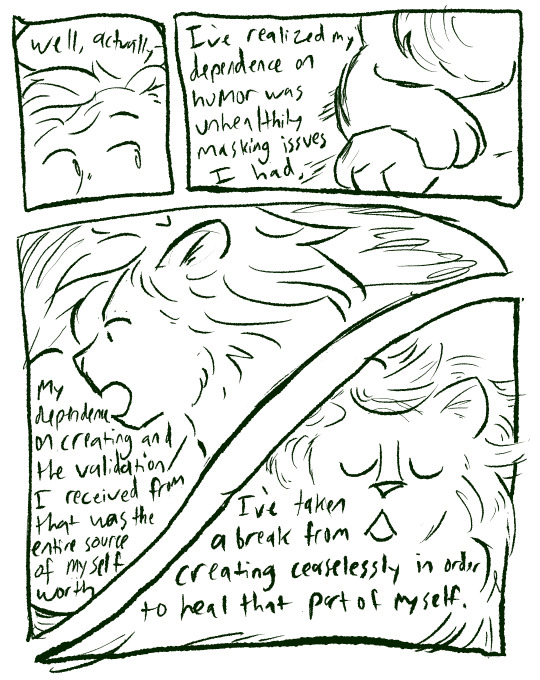
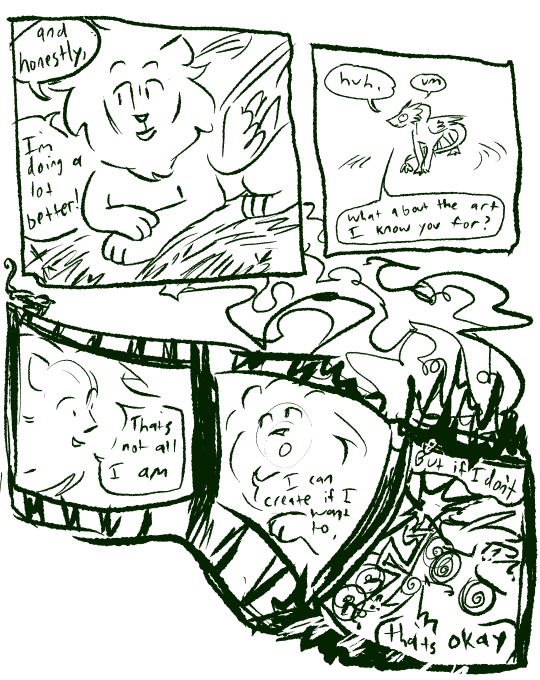
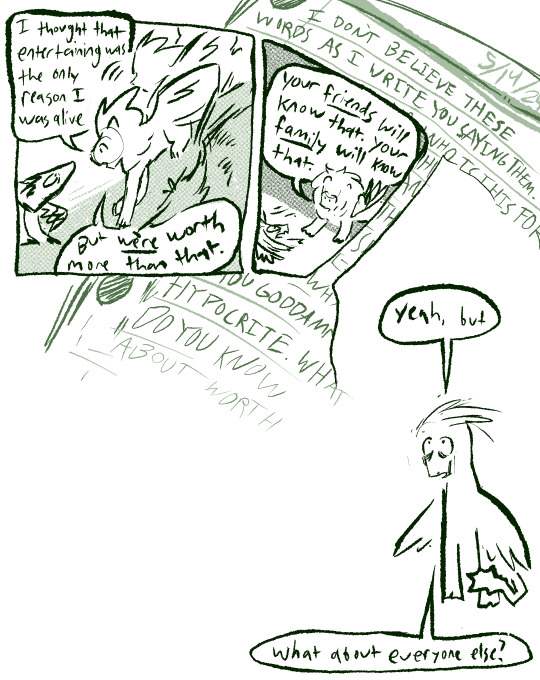
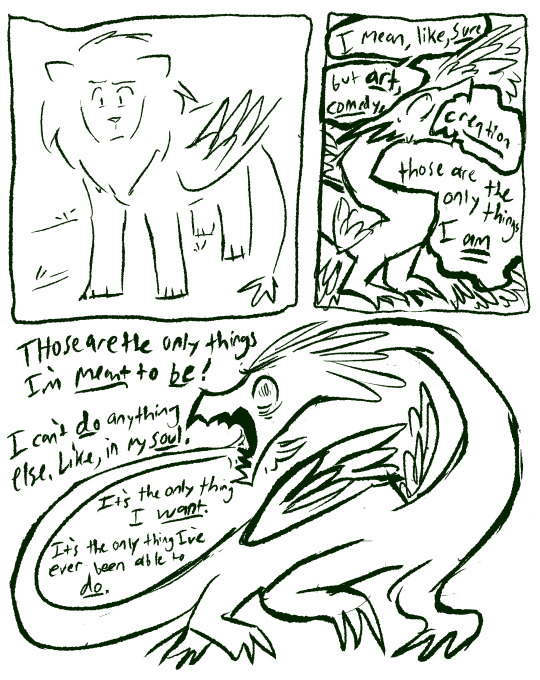
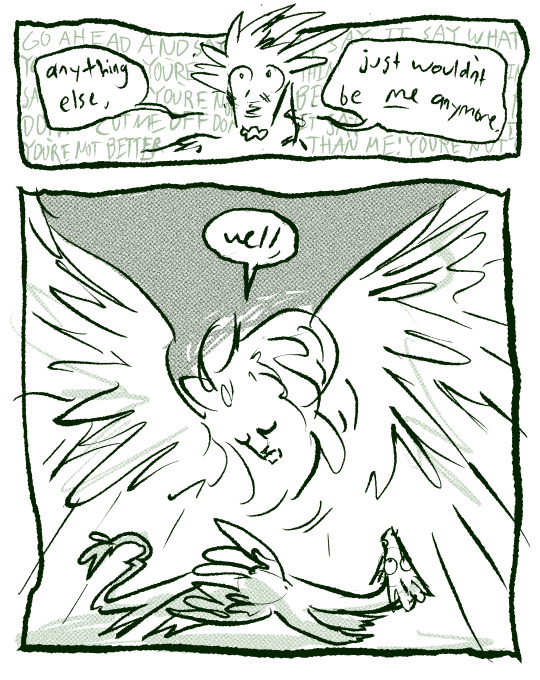

Legend tells of the carp that leapt over the Dragon Gate at the crest of a river and became a stand up comedian.
#also toyed with calling this comic riddle of the sphinx#but that had a little too much reference already associated with it#comic#comics#sphinx#dragon#ive been thinking so much about humor as related to the tortured artist and comedians and poets as sad artists etc etc#and how often that can be true but how this predominant cultural vision pigeonholes comedy as a low art or even just one you have to just#'be talented' at intrinsically. or even 'be sad enough' to be good at#instead of a craft you hone and an artform itself#this comic isnt exactly about that.#but it's related#it's more about... two very different kinds of people. but who are the same kind of artist#if that makes sense#and literally being scared of what you want#art tag#sequential art#personal comic#quite happy with how this one turned out. im excited to have made it i feel like its really different than my usual comics
985 notes
·
View notes
Text

#cherry blossom crime#collage#mental health#low empathy#no empathy#actually npd#npd safe#npd positivity#npd culture is#cluster b safe#npd#cluster b#actually cluster b#aspd safe#aspd#antisocial personality disorder#antisocial pd#narcissistic personality disorder#actually narcissistic
444 notes
·
View notes
Text
Honestly, I think apologizing is just a form of manipulation. It bothers you that the other person doesn't have a good attitude towards you, so you explain the situation, make any excuse, try to make them understand your perspective, and in the end you manage to soften them and change their attitude.
I don't think I've ever honestly apologized. When someone is upset with me, all I want is for them to stop being upset, because their attitude is inconvenient, and the only thing on my mind is "how can I talk my way out of this situation?".
#actually npd#actually narcissistic#cluster b#narcissistic personality disorder#npd safe#actually cluster b#npd culture is#narcissistic#npd#npd positivity#narc posting#npder#npd traits#cluster b safe#cluster b pds#no empathy#low empathy
321 notes
·
View notes
Text
Every now and then I think about how subtitles (or dubs), and thus translation choices, shape our perception of the media we consume. It's so interesting. I'd wager anyone who speaks two (or more) languages knows the feeling of "yeah, that's what it literally translates to, but that's not what it means" or has answered a question like "how do you say _____ in (language)?" with "you don't, it's just … not a thing, we don't say that."
I've had my fair share of "[SHIP] are [married/soulmates/fated/FANCY TERM], it's text!" "[CHARACTER A] calls [CHARACTER B] [ENDEARMENT/NICKNAME], it's text!" and every time. Every time I'm just like. Do they though. Is it though. And a lot of the time, this means seeking out alternative translations, or translation meta from fluent or native speakers, or sometimes from language learners of the language the piece of media is originally in.
Why does it matter? Maybe it doesn't. To lots of people, it doesn't. People have different interests and priorities in fiction and the way they interact with it. It's great. It matters to me because back in the early 2000s, I had dial-up internet. Video or audio media that wasn't available through my local library very much wasn't available, but fanfiction was. So I started to read English language Gundam Wing fanfic before I ever had a chance to watch the show.
When I did get around to watching Gundam Wing, it was the original Japanese dub. Some of the characters were almost unrecognisable to me, and first I doubted my Japanese language ability, then, after checking some bits with friends, I wondered why even my favourite writers, writers I knew to be consistent in other things, had made these characters seem so different … until I had the chance to watch the US-English dub a few years later. Going by that adaptation, the characterisation from all those stories suddenly made a lot more sense. And the thing is, that interpretation is also valid! They just took it a direction that was a larger leap for me to make.
Loose adaptations and very free translations have become less frequent since, or maybe my taste just hasn't led me their way, but the issue at the core is still a thing: Supernatural fandom got different nuances of endings for their show depending on the language they watched it in. CQL and MDZS fandom and the never-ending discussions about 知己 vs soulmate vs Other Options. A subset of VLD fans looking at a specific clip in all the different languages to see what was being said/implied in which dub, and how different translators interpreted the same English original line. The list is pretty much endless.
And that's … idk if it's fine, but it's what happens! A lot of the time, concepts -- expressed in language -- don't translate 1:1. The larger the cultural gap, the larger the gaps between the way concepts are expressed or understood also tend to be. Other times, there is a literal translation that works but isn't very idiomatic because there's a register mismatch or worse.
And that's even before cultural assumptions come in.
It's normal to have those. It's also important to remember that things like "thanks I hate it" as a sentiment of praise/affection, while the words translate literally quite easily, emphatically isn't easy to translate in the sense anglophone internet users the phrase.
Every translation is, at some level, a transformative work. Sometimes expressions or concepts or even single words simply don't have an exact equivalent in the target language and need to be interpreted at the translator's discretion, especially when going from a high-context/listener-responsible source language to a low-context/speaker-responsible target language (where high-context/listener responsible roughly means a large amount of contextual information can be omitted by the speaker because it's the listener's responsibility to infer it and ask for clarification if needed, and low-context/speaker-responsible roughly means a lot of information needs to be codified in speech, i.e. the speaker is responsible for providing sufficiently explicit context and will be blamed if it's lacking).
Is this a mouse or a rat? Guess based on context clues! High-context languages can and frequently do omit entire parts of speech that lower-context/speaker-responsible languages like English regard as essential, such as the grammatical subject of a sentence: the equivalent of "Go?" - "Go." does largely the same amount of heavy lifting as "is he/she/it/are you/they/we going?" - "yes, I am/he/she/it is/we/you/they are" in several listener-responsible languages, but tends to seem clumsy or incomplete in more speaker-responsible ones. This does NOT mean the listener-responsible language is clumsy. It's arguably more efficient! And reversely, saying "Are you going?" - "I am (going)" might seem unnecessarily convoluted and clumsy in a listener-responsible language. All depending on context.
This gets tricky both when the ambiguity of the missing subject of the sentence is clearly important (is speaker A asking "are you going" or "is she going"? wait until next chapter and find out!) AND when it's important that the translator assign an explicit subject in order for the sentence to make sense in the target language. For our example, depending on context, something like "are we all going?" - "yes" or "they going, too?" might work. Context!
As a consequence of this, sometimes, translation adds things – we gain things in translation, so to speak. Sometimes, it's because the target language needs the extra information (like the subject in the examples above), sometimes it's because the target language actually differentiates between mouse and rat even though the source language doesn't. However, because in most cases translators don't have access to the original authors, or even the original authors' agencies to ask for clarification (and in most cases wouldn't get paid for the time to put in this extra work even if they did), this kind of addition is almost always an interpretation. Sometimes made with a lot of certainty, sometimes it's more of a "fuck it, I've got to put something and hope it doesn't get proven wrong next episode/chapter/ten seasons down" (especially fun when you're working on a series that's in progress).
For the vast majority of cases, several translations are valid. Some may be more far-fetched than others, and there'll always be subjectivity to whether something was translated effectively, what "effectively" even means …
ANYWAY. I think my point is … how interesting, how cool is it that engaging with media in multiple languages will always yield multiple, often equally valid but just sliiiiightly different versions of that piece of media? And that I'd love more conversations about how, the second we (as folks who don't speak the material's original language) start picking the subtitle or dub wording apart for meta, we're basically working from a secondary source, and if we're doing due diligence, to which extent do we need to check there's nothing substantial being (literally) lost -- or added! -- in translation?
#translation#linguistics (sorta)#I love language so much#long post#subtitling#dubbing#transformative work#if you read all the way to the end - THANK YOU I am so impressed#localisation#this is not an academic essay but I still feel bad for not citing sources#low vs high context cultures and languages are concepts from intercultural communication studies#but idk how up to date that is or whether folks even still actually use them#I know they oversimplify things#but it helped me say what I was trying to here so shrug#languages#language soup#meta#language meta#fandom meta of sorts#thanks for the help sorting this out kayla <3#my nonsense
1K notes
·
View notes
Text

Today in Hip Hop History:
A Tribe Called Quest released their second album The Low End Theory September 24, 1991
#today in hip hop history#todayinhiphophistory#hiphop#hip-hop#hip hop#hip hop music#hip hop history#music#history#rap#hip hop culture#music history#a tribe called quest#the low end theory#album#emcee#mc#rapper#q tip#q-tip#ali shaheed muhammad#phife dawg#atcq#1991#music producer#dj#deejay#producer
1K notes
·
View notes
Text
You know what's hilarious, if Ludinus was indeed a young man being traumatized by the end of the Calamity. Deirta Thelyss is almost certainly older than he is.
This is not relevant but I think Essek should bring this up, just to be a bitch about it.
#for the purposes of showing my work: a beacon was found by leylas kryn 1200 years ago.#she was considered enough of a cultural leader or influence to convince people to follow her ergo likely an adult of some standing.#the other umavi of the ruling dens (aka deirta and abrianna) are suggested to have been around at the time as well#ludinus would be at most 1000 years old. they're all like. at LEAST 1400 mentally if not physically.#and that's the LOW estimate#as always how long was the calamity. are the umavi actually pre-calamity. that would be SO funny to me.#(pre-calamity and pre-divergence are different for the record.)#ludinus da'leth ain't SHIT#leylas kryn escaped lolth lived through the calamity and has gone through seven rebirths. ludinus WISHES#if ANYONE deserves to have beef with lolth it's leylas kryn for the record. I mean she does. canonically. BUT HERS IS MOST VALID#anyway as always the dynasty best country <3#if there are 99 ludinus haters I'm one of them if there's one it's me if there are none I've left this earth etc etc#he's just SO fun to hate and I do not respect him in the slightest nor do I think he deserves respect or validation.#I think he should get fucking sucked into a dark star and never be heard from again xoxo :3#cr spoilers#essek thelyss
260 notes
·
View notes
Quote
In another previous post, I wrote about how all these simultaneous declines in quality and quantity of personal relationships will leave many people in western countries very lonely- especially toward the end of their lives. And we are already seeing this in the form of a massive increase in older people living alone or warehoused in assisted living facilities over the past three decades. Given the continuously decreasing lower fertility and even looser family ties seen in each newer (and smaller) generation in the West, this problem is going to keep growing in the foreseeable future. By now, some readers might be wondering- what is my theory about the root cause of this problem? Well.. as I have indicated in previous posts, it is my opinion that most people in West have internalized the mindset of capitalism and neoliberalism to the point where they see every relationship and interaction through the lens of immediate personal profit and loss. They have thus effectively dehumanized everyone other than themselves or what they believe to be their own self- which is a whole other can of worms.
PharmaHeretic, “Why Are Relationships in Developed Countries so Ephemeral and Fragile?” (September 7th 2022).
0 notes
Text
youtube
0 notes
Note
Low empathy/sympathy cluster B culture is trying to be nice because you know logically that’s the right thing to do but people are being really annoying and you don’t have the energy to try and be compassionate
.
#cluster b culture is#low empathy cluster b culture is#low sympathy cluster b culture is#low empathy/sympathy cluster b culture is#cluster b#npd#aspd#bpd#hpd#Mod Reef#anonymous#MOOD
233 notes
·
View notes
Text

G thang
#lowrider#low low#waukegan#chi town#lowrider culture#chicago#car club#cutlass#Oldsmobile#Ricoh#Ricoh gr#Ricoh gr iii
692 notes
·
View notes
Note
npd + low empathy culture is "i'm sorry but i don't know what to say. i have no intention of hurting you with my indifference, i just don't feel anything. i can fabricate some answer and rely on cognitive empathy, but it'll only take me so far. i don't know how to comfort you, nor i want to bc honestly i can't really see past my own nose sometimes when it comes to feelings. i just don't feel anything, i am really, really sorry"
.
#npd culture is#low empathy npd culture is#npd#actually narcissistic#actually npd#narcissistic personality disorder#cluster b#low empathy
270 notes
·
View notes